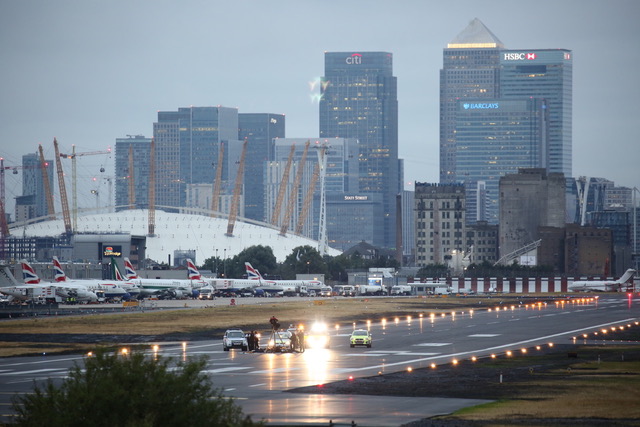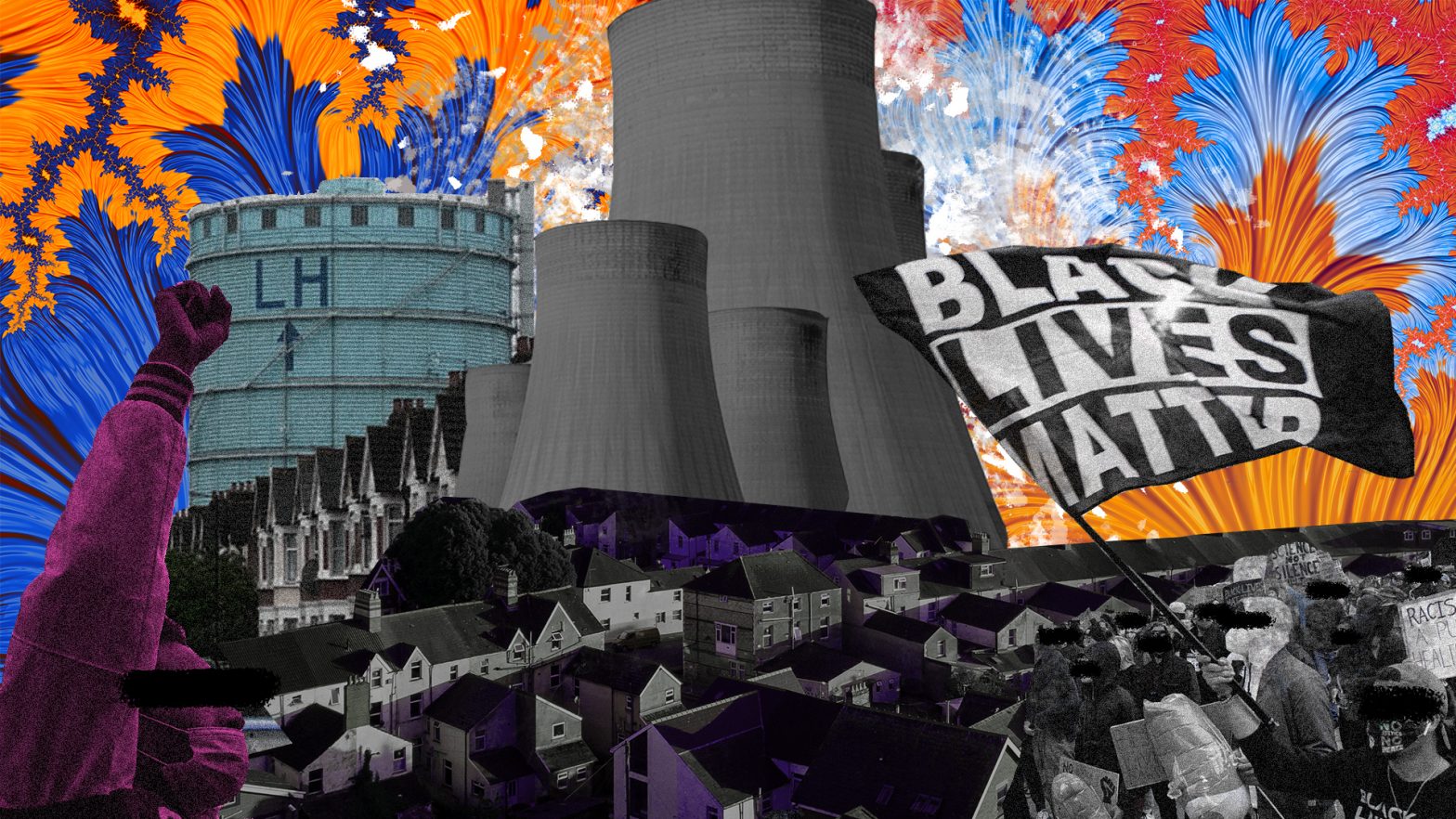This article was made possible by donations to the Black Creatives Fund. Donate now.
A tale of two shutdowns
In August 2016, Black Lives Matter UK (BLMUK) organised a national shutdown, blocking major transportation lines in Nottingham, Birmingham, Manchester and London. Thousands took to the streets to protest rampant racism in Britain, in a context of terrifying spikes in hate crimes in the aftermath of the Brexit vote. We made national headlines, of course not all of them positive, but overall our first shutdown went as well as we expected.
One month later, we organised a second shutdown. This time, we worked closely with environmental groups, including HACAN East – a group of east and south-east London residents resisting the expansion of London City Airport – as well as other direct action climate groups. With nine activists and a tripod, we shut down London City Airport.
Our message, summarised in a video we released at the time, was unequivocal: the climate crisis is a racist crisis. But in addition to the usual backlash, this shutdown was met with a different response, from the media and even within the anti-racist movement.
To our critics, it felt as if calling for an end to the climate crisis and environmental racism was a distraction from our focus on police and state brutality. At the activists’ trial, the judge said she found it “hard to see the link” between Black Lives Matter and climate change. I remember one friend at the time saying that with our second action, “BLMUK may have overstayed their welcome.”
Four years on, I still think about that action and what I learned from it. As chants of “Black lives matter” filled UK streets again this year, I wanted to revisit the relationship between climate injustice and police and state violence in the context of an idea which, though by no means new, has taken on new life in 2020: abolition.
To me, those two demands – an end to police brutality against Black people and an end to climate injustice and environmental racism – were always the same, both part of an expansive vision for Black liberation that centred health, safety and wellbeing for Black people in the UK and for our global family on the frontlines. This is a fundamentally abolitionist vision, in that it goes beyond calls to ‘stop harming Black people’, demanding instead that we fully divest from state violence and fund Black wellbeing and Black futures.
I believe that what was perceived as a distortion of BLMUK’s purpose was really our attempt to articulate a truly abolitionist vision for Black liberation.
Valuing life, redefining safety
Where abolition requires that we believe life to be precious, environmental injustice relies on the opposite belief. In the US, the government historically characterised certain areas as ‘National Sacrifice Areas’, places where people, land and water could be justifiably sacrificed to open-pit mining, the risk of oil spills or radiation from nuclear testing. Whether you’re looking at environmental racism, mass incarceration, or the grim crossover of the two, the US is often in a league of its own when it comes to barefaced disregard for life – but I feel like that term, ‘sacrifice areas’, aptly describes what is happening all over the world, including the UK.
From Blackpool to Newham, the most deprived areas and communities are sacrificed to make room for roads, for airports, for polluting industries, and for profit. Statistically, it’s no surprise that the first person in the UK to potentially have air pollution listed as a cause of death is a Black girl from Lewisham; nine-year-old Ella Kissi-Debrah suffered a fatal asthma attack in 2013 after pollution on the road near her house repeatedly broke legal limits in the years leading up to her death. Campaigns like Clean Air for Southall and Hayes (CASH) are yet another painful reminder that the most toxic substances, most dangerous industries and the most polluted roads are in the backyards of the poor, which in this country all-too-often means the backyards of Black people and people of colour.
There is a reason for this. Climate chaos and environmental destruction share the same roots as the disregard for Black, brown, Indigenous and poor lives. European colonialism’s dogged pursuit of domination and profit was made possible by ideologies which legitimised violence and extraction, ideologies that said some lands and some people are worth less, justifying ecocide, genocide and enslavement. These same ideologies are what continue to allow for neighbourhoods, livelihoods, natural habitats, and entire nations to be written off as ‘acceptable’ losses.

Climate destruction is a form of colonial violence, a form of harm sanctioned by the state. Imani Robinson, the Black organiser behind the IG handle @blackabolitionist explains: “Abolition is against state sanctioned violence and harm. But its goal is to transform harm. Instead of saying ‘what are we going to do about the inevitable violence of the world’, it says ‘well, what if violence wasn’t inevitable?'”
Abolition forces us to think practically about futures in which no one needs to be sacrificed. It offers an antidote to the ideologies and tools that justify harm, and suggests a pathway which actively values life, turning ‘Black Lives Matter’ from a slogan into a vision.
Building abolitionist futures means challenging the notion that police and prisons increase safety, but it also means thinking radically, honestly and expansively about what actually does keep us safe from harm in all its forms. To me safety is not just about being free from physical harm but being free from the oppressive structures that place limits on our ability to thrive and experience joy. So what keeps us safe in a climate just and abolitionist future? Money in our pockets, good affordable homes, strong community, food that is not only available but nutritious, clean air and water, equitable access to nature, time to care for one another.
Expansive visions
Earlier this year, the brutal killing of George Floyd by police in the US led to a new wave of uprisings across the world. Almost overnight, calls to ‘defund the police’ swept through our political landscape. First appearing tentatively on small placards, abolitionist politics – nurtured for years by organisations like INCITE! – have very quickly become the cornerstone of bold new visions for what might be.
I am excited to see the groups I am involved in, BLMUK and Wretched of the Earth, as well as many of our friends in the movement – including CAPE, Abolitionist Futures, Cradle Community and so many others – build the infrastructure and resources we need and deserve for our abolitionist and climate just visions to flourish.
For many of us working in climate justice as Black people and people of colour, we know that in a climate just world there can be no police, just as there can be no border control. We know it from our personal experiences of policing and the violence of borders. Many of the people I have been fortunate enough to fight alongside understand how the state is implicated in climate violence, from the criminalisation of activists, to the extrajudicial killings that happen daily on the frontlines. Our radical visions for climate justice are by nature abolitionist.
When I think about the kind of world I am working towards I am inspired by a poster made by Alán Pelaez Lopez (@MigrantScribble on Instagram), borrowing the line “There are Black people in the future” from visual artist Alisha B. Wormsley. Just as there are no prisons in the future, there are no oil spills or food poverty either.
We are in a time of great change. As solutions and visions are being drawn, it is time for us to be bold and offer up our most expansive visions for the kind of world we want to live in.
I’m grateful to Josina from Land In Our Names (LION), Ash and Angela from Wretched of the Earth, Joshua from BLMUK and Imani Robinson for conversations that made this piece possible.
